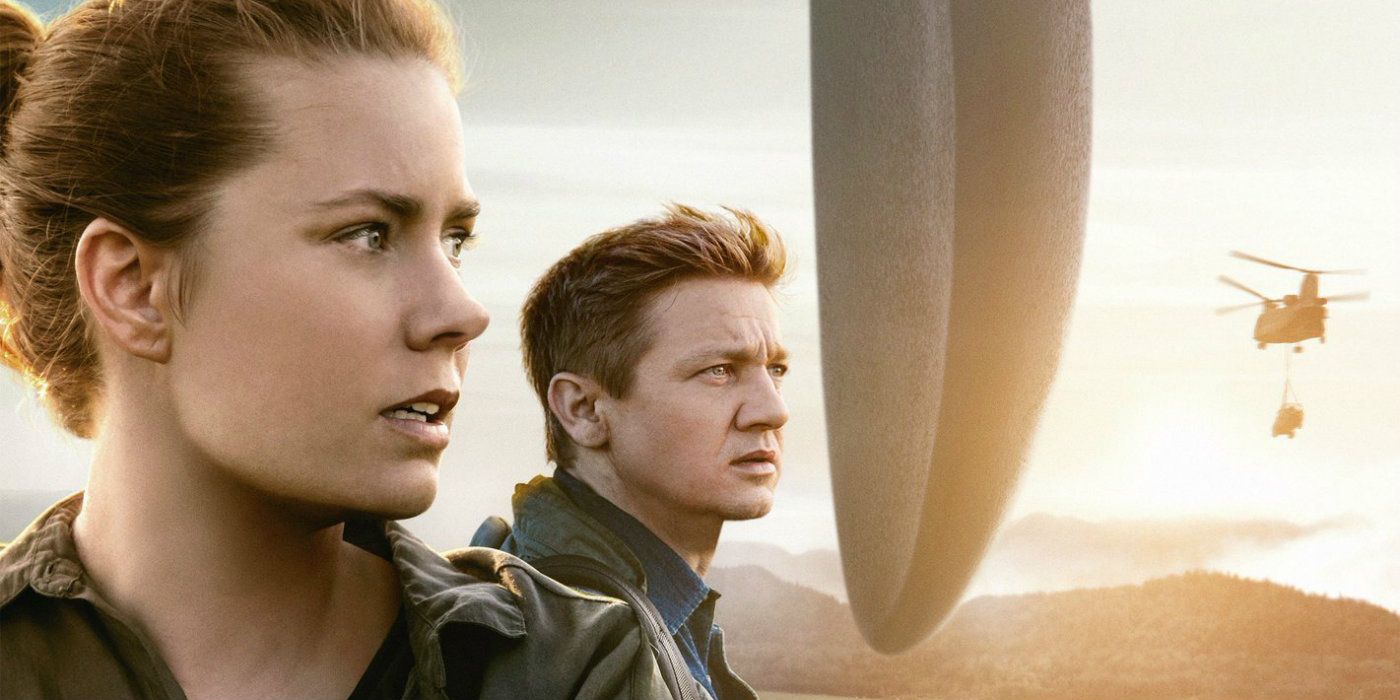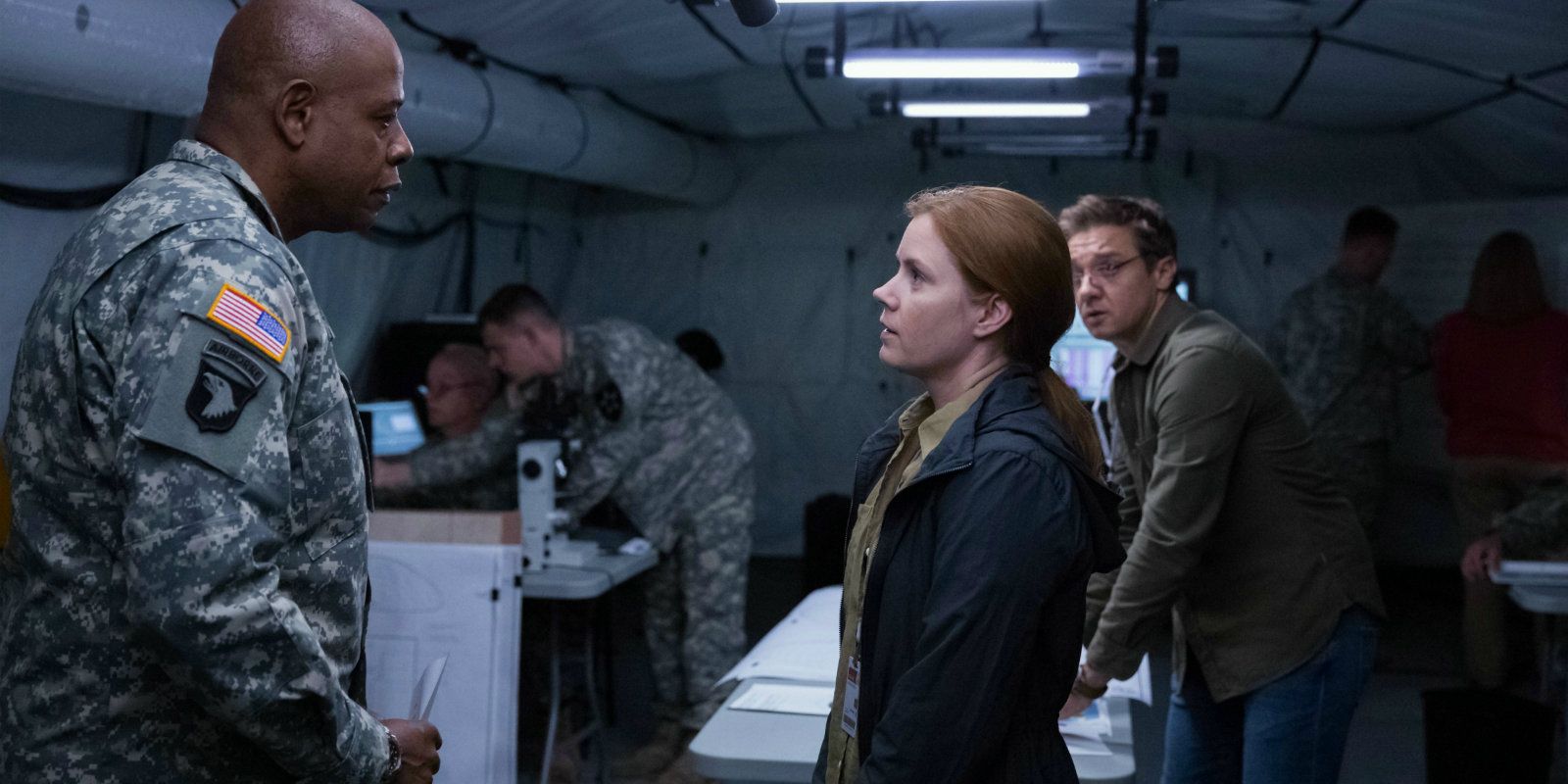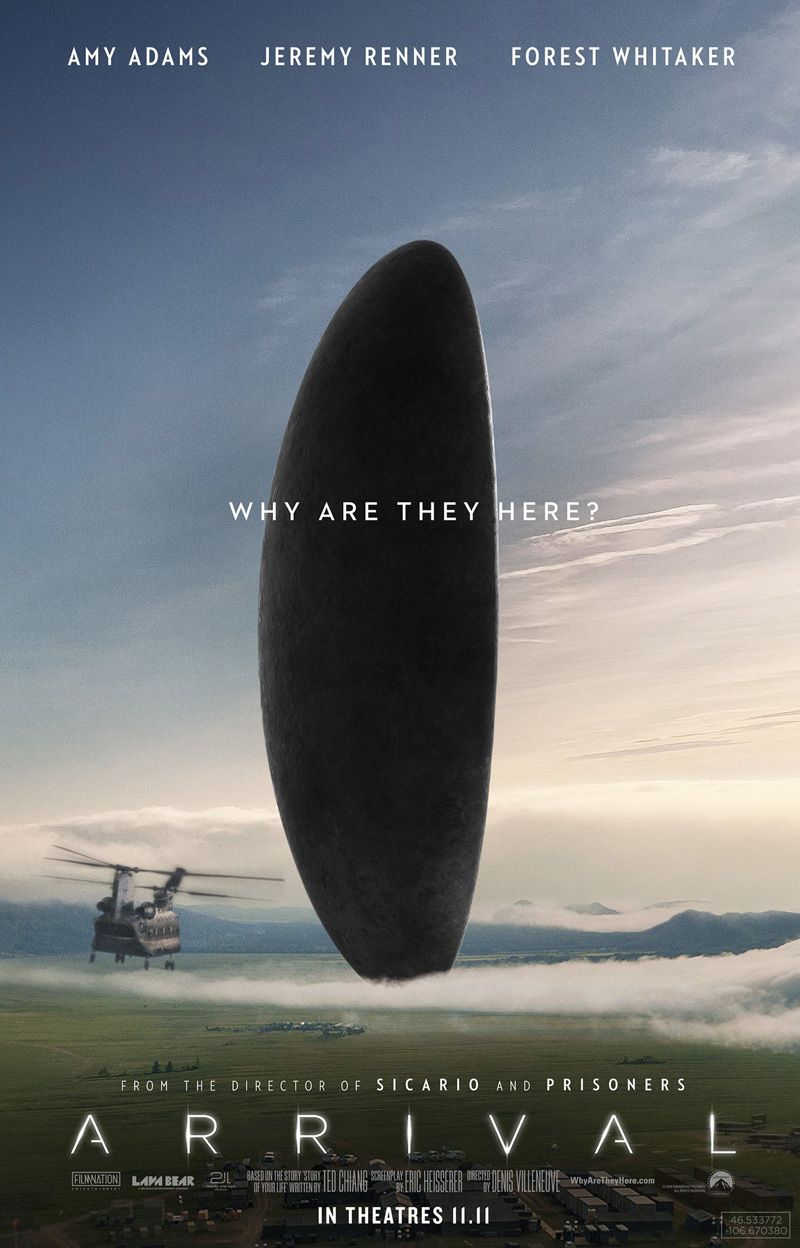Arrival is a smart tale of alien contact that boasts great visuals and performances, if also more brains than heart.
Human activity on Earth comes to a standstill when, one day, mysterious extraterrestrial spacecrafts appear and set down around the globe. Dr. Louise Banks (Amy Adams), a linguistics expert, and mathematician Ian Donnelly (Jeremy Renner) are among those recruited by U.S. Army Colonel Weber (Forest Whitaker) to approach one such spacecraft that has "landed" in Montana, in the hopes of making contact with the aliens and finding out 1) The reason they have come to Earth and 2) What their intentions are, now that they have arrived.
Communicating with these other-worldy visitors is easier said than done for Dr. Banks and her associates - as they discover that the aliens do have a written language, but one that is far more complex than any used by humans. With the clock ticking and the risk of a global war between humanity and the extraterrestrials growing every day, Louise finds herself on the verge of a breakthrough that could have profound implications for not only the aliens' presence on Earth, but also her own life.
Directed by Denis Villeneuve, Arrival plays out as a character drama by way of a slow-burn thriller (recalling Villeneuve's work on the film Prisoners) crossed with an enigmatic mystery narrative in the vein of the director's less-accessible 2014 film, Enemy. The final result is another excellent addition to Villeneuve's body of work as a filmmaker and a great addition to the long tradition of stories about humans meeting aliens for the first time - even though Arrival works better as an exercise in cerebral science-fiction than a poignant human story (despite its best efforts to be both).
Based on Ted Chiang's 1998 short story "Story of Your Life" and scripted by Eric Heisserer (Lights Out), Arrival succeeds at adapting the complicated literary devices used in Chiang's source material and translating them into effective cinematic storytelling techniques. Where Chiang's original short story uses different writing styles and tenses to reflect shifts in time and setting, Arrival transitions seamlessly between the scenes set in the present-day and those where Louise is lost in thoughts/dreams (spurned on by her attempts to communicate with and understand the aliens) - using distinct visual cues and edits that smartly juxtapose the story threads; bringing out deeper meaning in both and moving them forward at the same time. Arrival, in turn, both holds its cards close to the chest throughout much of its running time and keeps viewers engaged in what's happening onscreen in any given moment, even as they anticipate getting answers to the big questions that are raised over the course of the film.
Arrival is further elevated in the storytelling department by its precise use of both sound and imagery. The cinematography by Bradford Young (Selma) embraces an intentionally unvarnished aesthetic throughout, but leaves room for more striking visuals and camera movements to be included here without feeling out of place or drawing attention to themselves. Similar to his music for Villeneuve's crime drama/thriller Sicario, composer Jóhann Jóhannsson creates a pronounced sense of atmosphere and mood with an ambient score here - one where the film's themes emulate the sounds of Arrival's extraterrestrial visitors (themselves being familiar, yet unique variations on tried-and-true physical designs for aliens featured in movies past).
Where Arrival struggles is to occupy a comfortable balancing spot between a sentimental sci-fi movie like Steven Spielberg's Close Encounters of the Third Kind and a more purely cerebral sci-fi drama in the vein of Stanley Kubrick's 2001: A Space Odyssey (and the many sci-fi films that have been influenced by both Spielberg and Kubrick's landmark work since then). While Spielberg's own attempt to merge his style with Kubrick's on A.I. Artificial Intelligence leaned more towards being the former, Arrival is more the latter - making the moments and scenes where it does try to pull on moviegoers' heartstrings less emotionally impactful and feeling out of place with the rest of the film, tone-wise.
Louise's personal journey and evolution over the course of Arrival is more interesting to watch unfold than it is moving - reflecting the larger issue that hampers Villeneuve's otherwise excellent sci-fi drama. There are political overtones to Louise's belief in the importance of communication and the power of even simple words, but the way the film explores these issues feels like a natural extension of its first contact story (and Louise's experiences), keeping the commentary subtle, yet on-point. Amy Adams further grounds everything that happens with yet another strong performance here - portraying Louise as someone with an explorer's spirit and passion, but also a compassionate streak (and something of a lonely soul).
Jeremy Renner brings some of the same wit and confidence that he has while playing Hawkeye to his performance as Ian Donnelly, at the same that he plays up the character's scientific outlook and sensibilities in Arrival. Forest Whitaker as Colonel Weber is more of a supporting player here, but the Oscar-winner imbues the character with a believable no-nonsense manner and the feeling of being someone with years of experience under their belt. Arrival's ensemble is rounded out by such character actors as Michael Stuhlbarg and Tzi Ma in second-tier, yet essential roles in the film's overarching narrative.
Arrival is a smart tale of alien contact that boasts great visuals and performances, if also more brains than heart. While the movie has a more optimistic perspective on humanity and its place in the larger scheme of things than something like Ex Machina, both films take a similarly cerebral approach to the sci-fi genre and their respective premises. Arrival's efforts to create a warmer emotional throughline to go along with its intellectual subject matter have trouble hitting their mark; yet the blend of thought-proving sci-fi and human drama here is arguably more cohesive than that in Interstellar, to use a comparable example. When all is said and done though, Arrival is another Denis Villeneuve film both worthy of admiration and much of the awards buzz that it has generated - in addition to being one of the better mainstream sci-fi movies released in recent memory.
TRAILER
Arrival is now playing in U.S. theaters nationwide. It is 116 minutes long and is Rated PG-13 for brief strong language.
Let us know what you thought of the film in the comments section!






